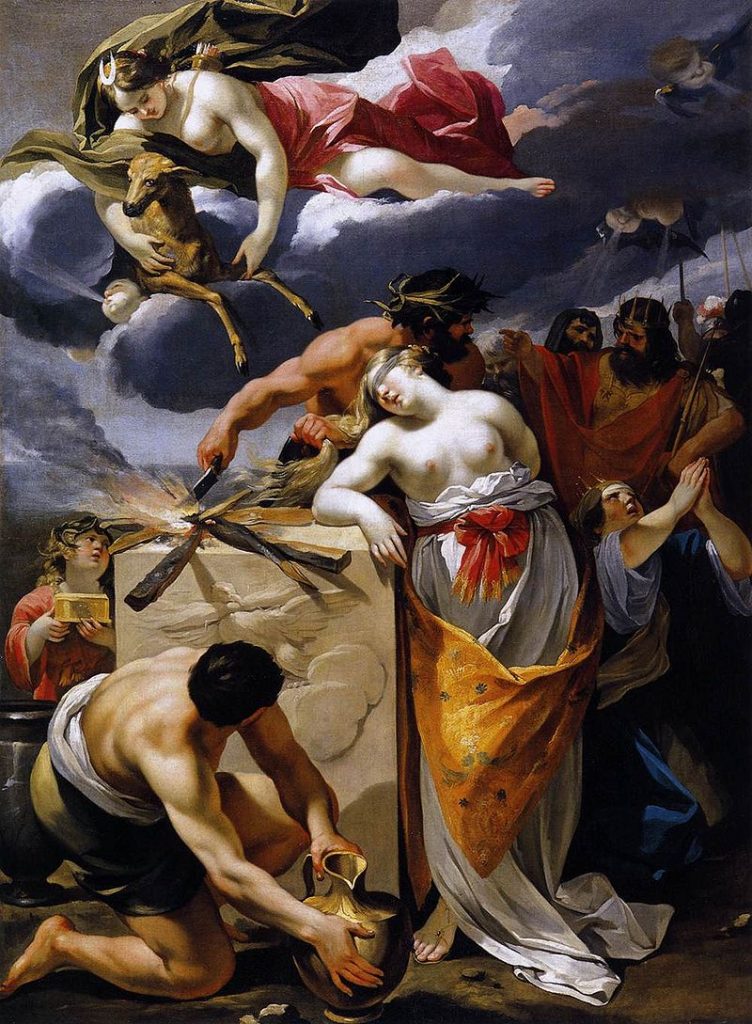Iphigenia, The Sacrifice
Iphigenia is a tragic figure in Greek mythology, known for being sacrificed by her father Agamemnon to appease the goddess Artemis.

- Alias – The Sacrifice
- Gender – Female
- Race – Human
- Occupation – Princess/Priestess of Artemis (Sacred Huntresses) / Witch
- Religion – Hellenic Pantheon
- Allies – Her family and the people of her city
- Enemies – Agamemnon, who was forced to sacrifice her to the goddess Artemis
- Abode/Base of operations – Aulis, Greece
- Nationality – Greek City State
- Languages – Ancient Greek
- Alignment – Lawful Good
- Affiliation(s) – Her family and the temple of Artemis
- Significant others – (Father) Agamemnon, (Mother) Clytemnestra, (Siblings), Iphigenia, Electra, Laodice, Orestes, Chrysothemis, Aletes, Erigone
Iphigenia was a daughter of King Agamemnon and Queen Clytemnestra in Greek mythology. She was known for her beauty and her tragic fate, which was tied to her father’s decision to sacrifice her to appease the goddess Artemis and ensure favorable winds for the Greek fleet during the Trojan War.
Despite her royal status, Iphigenia was not immune to the whims of the gods and the politics of her family. She was deeply devoted to her father and trusted him completely, even when he deceived her into traveling to the Aulis port under the pretense of arranging her marriage. Once there, she realized the true nature of her father’s plans and faced a devastating choice: either sacrifice herself for the sake of her country, or refuse and bring shame and dishonor to her family.
Despite the overwhelming pressure, Iphigenia showed remarkable strength and courage. She willingly accepted her fate and even performed the sacrificial rites, accepting her death with dignity and grace. Her story has been retold in various forms of literature and drama, each emphasizing different aspects of her character and the tragedy of her life.
In terms of her physical appearance, Iphigenia was a beautiful and graceful young woman with long curly hair and fair skin. She had a tall and slender frame with delicate features, and her eyes shone with a gentle light. Despite her regal bearing, she always had a kind and approachable demeanor, which endeared her to many who knew her. She often wore flowing robes that accentuated her natural beauty and seemed to move with her in the breeze. Her presence commanded respect, and her gentle voice had a soothing effect on those around her.
Her beauty was said to rival that of the goddess Aphrodite, and it was often noted as a key factor in her tragic fate. Despite her physical charms, however, it was her inner strength and conviction that truly defined her character and made her a memorable figure in Greek mythology.
Artemis punished Agamemnon after he killed a sacred deer in a sacred grove and boasted he was a better hunter. On his way to Troy to participate in the Trojan War, Agamemnon’s ships were suddenly motionless as Artemis stopped the wind in Aulis. A soothsayer named Calchas revealed an oracle that the only way to appease Artemis was to sacrifice Iphigeneia to Artemis as he did so. Iphigenia was taken by Artemis to Tauris in Crimea to prepare others for sacrifice after the goddess left a goat in her place. After years of wild sacrifice she became a follower of the goddess a f Hecate.
Iphigeneia factors into the story of her brother, Orestes. In order to escape the persecutions of the erinyes for killing his mother Clytemnestra and her lover, he is ordered by Apollo to go to Tauris, carry off the statue of Artemis which had fallen from heaven, and bring it to Athens. He repairs to Tauris with Pylades, son of Strophius and intimate friend of Orestes, and the pair are at once imprisoned by the Tauri, among whom the custom is to sacrifice all Greek strangers to Artemis.
The priestess of Artemis, whose duty it is to perform the sacrifice, is his sister Iphigeneia. She offers to release Orestes if he will carry home a letter from her to Greece; he refuses to go, but bids Pylades take the letter while he himself will stay and be slain. After a conflict of mutual affection, Pylades at last yields, but the letter brings about a recognition between brother and sister, and all three escape together, carrying with them the image of Artemis. After their return to Greece, Orestes takes possession of his father’s kingdom of Mycenae and Argos and Iphigeneia leaves the image in the temple of Artemis in Brauron, Attica, where she remains as priestess of Artemis.
Iphigenia, High Priestess of Artemis

Medium humanoid (human), lawful good
Armor Class: 16 (studded leather) Hit Points: 105 (14d8 + 42) Speed: 30 ft.
| STR | DEX | CON | INT | WIS | CHA |
|---|---|---|---|---|---|
| 10 (+0) | 18 (+4) | 16 (+3) | 14 (+2) | 20 (+5) | 22 (+6) |
Skills: Insight +9, Medicine +9, Religion +6
Senses: passive Perception 15
Languages: Ancient Greek, Latin
Challenge Rating: 12 (8,400 XP)
Magic Resistance. Iphigenia has advantage on saving throws against spells and other magical effects.
Spellcasting. Iphigenia is a 14th-level spellcaster. Her spellcasting ability is Wisdom (spell save DC 17, +9 to hit with spell attacks). She has the following cleric spells prepared:
Cantrips (at will): guidance, resistance, sacred flame, thaumaturgy
- 1st level (4 slots): bless, cure wounds, detect evil and good, protection from evil and good
- 2nd level (3 slots): calm emotions, lesser restoration, spiritual weapon
- 3rd level (3 slots): dispel magic, protection from energy, spirit guardians
- 4th level (3 slots): death ward, freedom of movement, guardian of faith
- 5th level (2 slots): commune, mass cure wounds
- 6th level (1 slot): harm, heal
- 7th level (1 slot): divine word
Divine Eminence. As a bonus action, Iphigenia can expend a spell slot to cause her melee weapon attacks to deal an extra 1d8 radiant damage to a target on a hit. This benefit lasts until the end of the turn. If the attack misses, the spell slot is still expended.
Innate Spellcasting. Iphigenia’s innate spellcasting ability is Wisdom (spell save DC 17). She can cast the following spells at will:
At will: detect evil and good, detect magic, light, mending, sacred flame
Actions
Multiattack. Iphigenia makes three melee attacks.
- Longsword. Melee Weapon Attack: +9 to hit, reach 5 ft., one target. Hit: 8 (1d8 + 4) slashing damage, or 9 (1d10 + 4) slashing damage if used with two hands, plus 7 (2d6) radiant damage.
- Healing Touch (3/day). Iphigenia touches another creature. The target magically regains 40 (8d8 + 4) hit points and is freed from any curse, disease, poison, blindness, or deafness.
- Turn Undead. Iphigenia presents her holy symbol and speaks a prayer censuring the undead. Each undead that can see or hear her within 30 feet of her must make a Wisdom saving throw. If the creature fails its saving throw, it is turned for 1 minute or until it takes damage.
- Divine Intervention (1/day). If Iphigenia is in need, she can call on Artemis to intervene on her behalf. This acts as the wish spell, but the effects are left to the discretion of the DM. After using this feature, Iphigenia cannot use it again for 7 days.
Equipment
studded leather armor, longsword, light crossbow with 20 bolts, holy symbol of Artemis, explorer’s pack, 50 gold pieces.
Description
Iphigenia is a regal-looking woman with piercing blue eyes and long, flowing blonde hair. She is always dressed in the white and gold vestments of a high priestess of Artemis, and carries herself with a calm and commanding presence.
Personality
As a devoted priestess of Artemis, Iphigenia is fiercely dedicated to protecting the natural world and its inhabitants. She is unflinching in the face of danger and will stop at nothing to defend those in need, even if it means putting herself in harm’s way. She is also a wise and empathetic counselor, with a deep understanding of the human heart and a gift for soothing troubled souls.
Conclusion
Iphigenia, High Priestess of Artemis, is a formidable and devout ally to have on any adventure. With her potent spellcasting and holy prowess, she is a valuable addition to any party seeking to uphold justice and protect the innocent.

 Buy me a coffee
Buy me a coffee